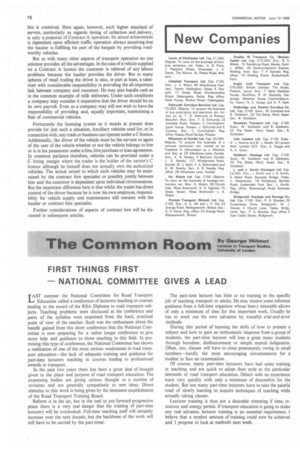FIRST THINGS FIRST NATIONAL COMMITTEE GIVES A LEAD
Page 80

If you've noticed an error in this article please click here to report it so we can fix it.
T AST summer the National Committee for Road Transport
Education called a conference of lecturers teaching in courses leading to the award of the RSA Diploma in road transport subjects. Teaching problems were discussed at the conference and parts of the syllabus were examined from the hard, practical point of view of the teacher. Such was the enthusiasm about the benefit gained from this short conference that the National Committee is now preparing for a rather longer conference to give more help and guidance to those teaching in this field. In promoting this type of conference, the National Committee has shown a realization of one of the most serious weaknesses in road transport education—the lack of adequate training and guidance for part-time lecturers teaching in courses leading to professional awards in transport. In the past two years there has been a great deal of thought given to the place and purpose of road transport education. The examining bodies are giving serious thought to a number of revisions and are generally sympathetic to new ideas. Direct stimulus to this work is being given by the imminent establishment of the Road Transport Training Board.
Reform is in the air, but in the zeal to put forward progressive plans there is avery real danger that the training of part-time lecturers will be overlooked. Full-time teaching staff will certainly increase over the next decade, but the backbone of the work will still have to be carried by the part-timer.
The part-time lecturer has little or no training in the specific job of teaching transport to adults. He may receive some informal guidance from a full-time organizer whose heavy timetable allows of only a minimum of time for this important work. Usually he has to work out his own salvation by wasteful trial-and-error methods.
During this period of learning the skills of how to present a subject and how to gain an enthusiastic response from a group of students, the part-time lecturer will lose a great many students through boredom, disillusionment or simple mental indigestion. Often, too, classes will have to close prematurely owing to small numbers—hardly the most encouraging circumstances for a student to face an examination.
Of course, many part-time lecturers have had some training in teaching and are quick to adopt their style to the particular demands of road transport education. Others with no experience learn very quickly with only a minimum of discomfort for the student. But too many part-time lecturers have to take the painful road of slowly learning to acquire techniques of teaching while actually taking classes.
Lecturer training is thus not a desirable trimming if time, resources and energy permit. If transport education is going to make any real advance, lecturer training is an essential requirement. I believe that a modest amount of training could now be achieved and I propose to look at methods next week.




























































































































